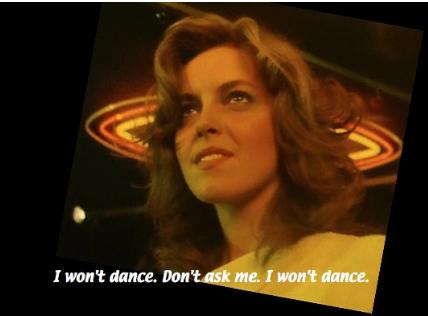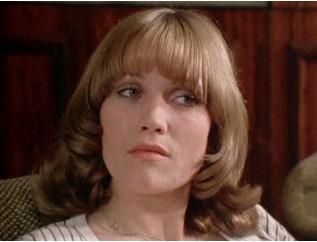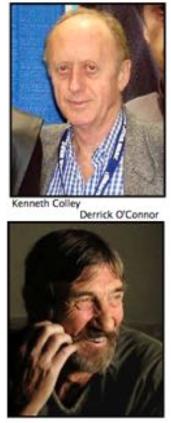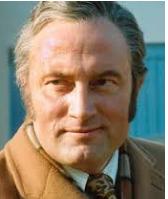![]()

Riding the Intercity to Granada’s Manchester studios I found myself sat opposite a restless man who seemed eager to talk. It turned out that he was a club entertainer who was on his way to, what he said, would be his last gig. He was not an old man; perhaps in his early forties. He told me that he had started out in showbiz while he was still in his teens and, while he had never achieved the success that he had hoped for, he had, not only been able to support himself, but also raise a family on the proceeds. I asked him why he now wanted to give it up. He told me that from the start he had suffered nerves before going on but had assumed that as he got more experienced it would fade away. Instead it had got gradually worse. Now he could never go on without being sick into a bucket several times. The horror of it all had just become too much for him. His tale made me realise that stage-fright is not just a passing flutter of the heart, but a very real adversary.
In the est training there had been a notorious stage that all had to pass through, called The Fear Process; I believe that it was actually called something else by the organisers but those who had gone through it always referred to it as The Fear Process. This simply required participants to stand in a line on a stage facing the audience — and do nothing. They were not allowed to smile, frown make comments or attitudinise in any way; they simply had to stand. If they did anything else they were immediately shouted down. It was astonishing how difficult this proved; some started shaking all over, others hysterically protesting, othershyperventilating, some simply burst into tears. After a while several assistants came and stood directly in front of each participant in turn, staring straight into their eyes until they were able to calmly look back. There were a number of professional actors in my training, some well-known, and I was interested to find that, contrary to what one might have expected, they were affected as much as anyone-else. It appeared that all their experience of going on stage counted for nothing when they were stripped of a character behind which to hide.
It seems that in all of us there is a deep-rooted conflict between the desire to be seen and the fear of exposure to the other’s gaze. No doubt the life-affirming exhilaration that many actors feel after a successful performance comes from having overcome this natural resistance, having passed through the curtain of fear and returned unscathed. For most the thrill outweighs the terror, but the balance can, sometimes unexpectedly, tip the other way. This is what happened to a young actress with whom I worked named Elizabeth Cassidy. While the business rejects many hopefuls outright, and gradually wears others down with time, it is comparatively rare for an actor who is young and successful, with a future ahead, to voluntarily give it all up.
 After leaving drama school Elizabeth Cassidy quickly gained a string of TV credits, most notably a starring role, first in the TV film, Gangsters, directed by Philip Saville, and then in the two series of the same name which followed. It was as director on the last of these that I met Liz. Firstly, I noticed that she became very twitchy when time was taken lining up shots of her. Then I discovered that she was frequently missing from publicity shots because she would make excuses not to turn up. So there are very few shots of her, other than screen shots to be found. Despite her good looks, Liz hated to be photographed when she was not immersed in a role. A year or so later I worked with her again on an episode of Crown Court. She was talking then about giving it up the business, that the constant stress and uncertainty had become too much for her, but, as she said it with a laugh, I did not take her too seriously. Actors frequently talk of giving it up but rarely do. It was only much later that I discovered this show was the last title to appear on her IMDb credit list. I did, however, work with Liz once after that, five years later, when she came in as an assistant casting director on my play, The Personal Touch.
After leaving drama school Elizabeth Cassidy quickly gained a string of TV credits, most notably a starring role, first in the TV film, Gangsters, directed by Philip Saville, and then in the two series of the same name which followed. It was as director on the last of these that I met Liz. Firstly, I noticed that she became very twitchy when time was taken lining up shots of her. Then I discovered that she was frequently missing from publicity shots because she would make excuses not to turn up. So there are very few shots of her, other than screen shots to be found. Despite her good looks, Liz hated to be photographed when she was not immersed in a role. A year or so later I worked with her again on an episode of Crown Court. She was talking then about giving it up the business, that the constant stress and uncertainty had become too much for her, but, as she said it with a laugh, I did not take her too seriously. Actors frequently talk of giving it up but rarely do. It was only much later that I discovered this show was the last title to appear on her IMDb credit list. I did, however, work with Liz once after that, five years later, when she came in as an assistant casting director on my play, The Personal Touch.
For the general public it can come as a surprise to learn that actors are more often than not rather shy people. It seems counter-intuitive that they should choose to expose their inner being on stage and screen for a living but I see this as proof of the strength of their drive to be seen and heard. They have learnt to pass from an oppressive introverted world of self-regard into an extroverted state of bathing in the attention of others. Sometimes one can see an immediate positive effect of this release from the tensions of ordinary life. The slouch-shouldered, mumbling actor suddenly takes on real presence; his posture, his voice, his look, everything changes. This is something more fundamental than just acting a role; it is a transformation of the whole instrument that makes the successful acting of a role possible.
 When I first met the actor Kenneth Colley, I was alarmed to discover that he had a shallow cough that seemed to uncontrollably interrupt his conversation every few minutes. I soon established that this was a chronic nervous condition and not a passing infection. However, he assured me that as soon as he started to act it would disappear. And, sure enough, as if by magic, it did. However, with Derrick O’Connor, another actor on the same show, an habitual hand gesture, that I had hardly noticed in ordinary conversation, proved more obdurate when it came to his performance. First I just asked him to eliminate it, but this did not work; so I suggested that he hold his hands behind his back. This was fine for a bit but then, suddenly, one hand would jump free and fly up in front of his face. Derrick himself seemed surprised at it’s recalcitrance. In the end, for the purpose of rehearsal, I resorted to tying his hands together.
When I first met the actor Kenneth Colley, I was alarmed to discover that he had a shallow cough that seemed to uncontrollably interrupt his conversation every few minutes. I soon established that this was a chronic nervous condition and not a passing infection. However, he assured me that as soon as he started to act it would disappear. And, sure enough, as if by magic, it did. However, with Derrick O’Connor, another actor on the same show, an habitual hand gesture, that I had hardly noticed in ordinary conversation, proved more obdurate when it came to his performance. First I just asked him to eliminate it, but this did not work; so I suggested that he hold his hands behind his back. This was fine for a bit but then, suddenly, one hand would jump free and fly up in front of his face. Derrick himself seemed surprised at it’s recalcitrance. In the end, for the purpose of rehearsal, I resorted to tying his hands together.
Eric Morris calls these habitual quirks, ticks and mannerisms dependencies. (41) Sometimes they can be cultivated into signature behaviours by which we come to know the actor, but they are still defences and distractions that interrupt the flow of real experience. And sometimes these set into insurmountable blocks that stand in the way of the actor fulfilling his obligations to the part. It came as quite a shock to me to discover that Greta Scacchi in her twenties, lithe and fit, could not, or would not, dance to beat music. She could play a deeply sensual love scene, appear completely nude, but she could not do a passable disco dance. What was it that held her back? One could only conjecture that it was something from way back in her childhood or adolescence. A director on set never has time to deal with these things and can only find ways of working around them. Shooting a nightclub scene for Bergerac all I could do was get Greta to fake it by doing turns in front of the camera while others danced around her.
 An equally surprising but more insurmountable problem was encountered when working with Iain Cuthbertson on Sutherland’s Law. Iain was the star of the series, an imposing leading actor, with a long list of stage and TV credits and his own popular following. In the script I had there was a simple, but rather touching scene with Edith MacArthur, his life partner. It was an anniversary scene which, was not overly sentimental, but called for a simple expression of tenderness. In rehearsals I sensed that Iain was trying towork his way around this scene, indicating what was to happen but never portraying it. When pressed he brushed asides my concern and asked me to trust him. This is the very worse thing a director can be asked to do. Firstly, it is hard to say that you do not trust an experienced artiste of talent and repute. But, secondly, if you do you are left with nothing to work with. Of course no-one expects full-blown passion in a rehearsal, but a director needs enough to be able to sense what the performance will be. In this case I soon realised that Iain had hit a block. The scene required an emotion that he was not able to give. Where a gentle embrace was called for, all that Iain could muster was a chummy clap on the back that one fella might give another after a night out.
An equally surprising but more insurmountable problem was encountered when working with Iain Cuthbertson on Sutherland’s Law. Iain was the star of the series, an imposing leading actor, with a long list of stage and TV credits and his own popular following. In the script I had there was a simple, but rather touching scene with Edith MacArthur, his life partner. It was an anniversary scene which, was not overly sentimental, but called for a simple expression of tenderness. In rehearsals I sensed that Iain was trying towork his way around this scene, indicating what was to happen but never portraying it. When pressed he brushed asides my concern and asked me to trust him. This is the very worse thing a director can be asked to do. Firstly, it is hard to say that you do not trust an experienced artiste of talent and repute. But, secondly, if you do you are left with nothing to work with. Of course no-one expects full-blown passion in a rehearsal, but a director needs enough to be able to sense what the performance will be. In this case I soon realised that Iain had hit a block. The scene required an emotion that he was not able to give. Where a gentle embrace was called for, all that Iain could muster was a chummy clap on the back that one fella might give another after a night out.
There are many fears contained in the fear of exposure that is commonly called stage fright: the fear of embarrassment, the fear of inadequacy, the fear of intimacy, the fear of losing control, the fear that everything we want to keep hidden will come tumbling out. A particular character, a particular drama may allow the actor to break through the confines of his habitual self but a stubborn residue inevitably remains — the fear that the act we maintain in real life will crumble and we will be seen for what we are.